In this edition of court judgements review, we look at Supreme Court’s judgement on Anticipatory bail, sexual assault on children, Kerala High Court’s decision on Stalking, Delhi High Court’s judgement on invocation of Protection of Women from Sexual Harassment Act, 2013, Jammu & Kashmir High Court’s judgement on abetment to suicide and Madras High Court’s judgement on ‘Authorized Officer’ under Mines and Minerals Act.
Supreme Court: When considering applications for anticipatory bail, courts should also consider factors such as the nature and gravity of the offences, and the specific facts of the case.
In Pratibha Manchanda vs. State of Haryana, the Supreme Court held that the relief of anticipatory bail presents challenges in maintaining a delicate balance between individual rights and the interests of justice, and the courts should strike a balance in protecting public interests as well as safeguarding individual rights.
The two-judge bench of the apex court comprising of Justice Surya Kant and Justice C.T. Ravi Kumar was hearing an appeal against the judgement of the High Court of Punjab and Haryana that allowed anticipatory bail to the accused against whom charges of forging documents to illegally transfer the ownership of land worth crores of rupees were framed. The additional sessions judge declined the bail plea, while the High Court allowed the anticipatory bail subject to the fulfilment of certain conditions.
The apex court, after careful consideration of both sides, held that offences of forging documents for transferring ownership of land worth crores of rupees are grave in nature.
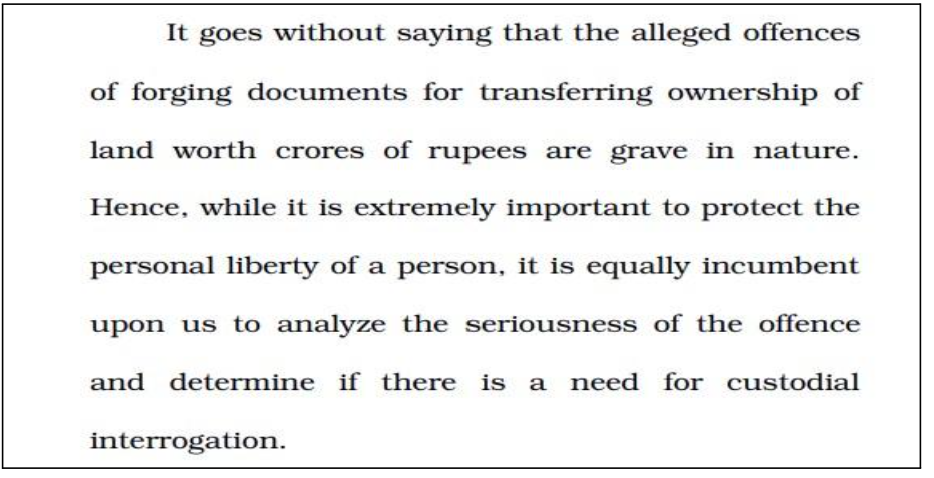
The Apex court relied on its earlier judgement in Sushila Aggarwal vs. State (NCT of Delhi), whereby it was held that when considering applications for anticipatory bail, courts should consider factors such as the nature and gravity of the offences, the role attributed to the applicant, and the specific facts of the case. Further,
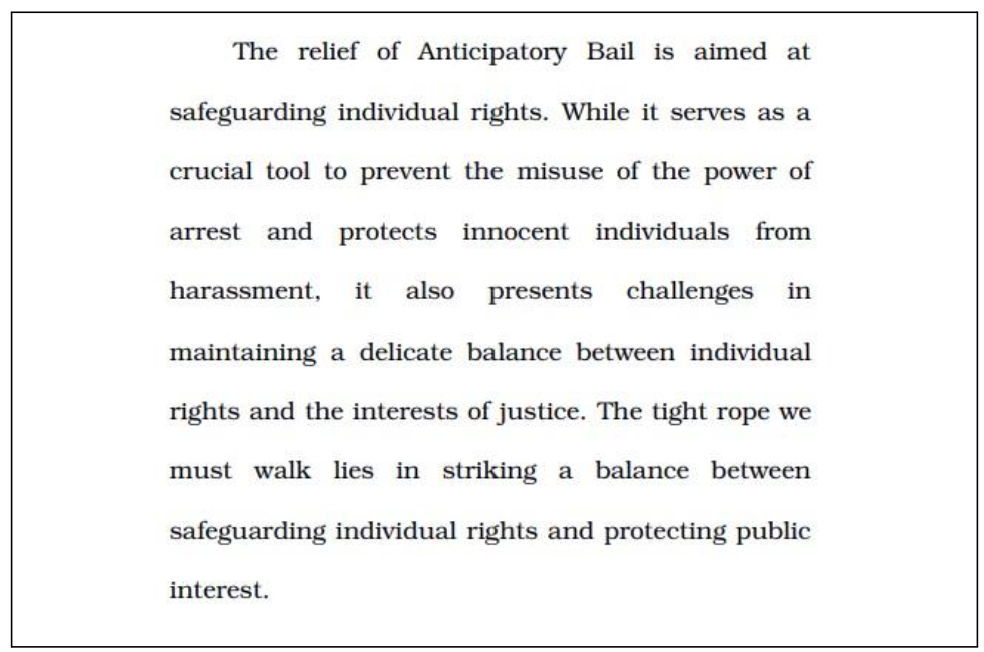
Upon looking at the facts of the case, the apex court highlighted the dubious nature of this transaction, casting a shadow over its legitimacy. The court further talked about how land scams are becoming persistent, which not only results in financial losses to individuals but also hinders socio-economic progress. It felt that an unimpaired and unobstructed investigation is necessary to unearth any such land mafia.
While refusing to interfere in the exercise of judicial discretion by the High Court, it cautioned the High Court to exercise this in accordance with the fundamental principles of anticipatory bail laid down in various decisions over time by this Court.
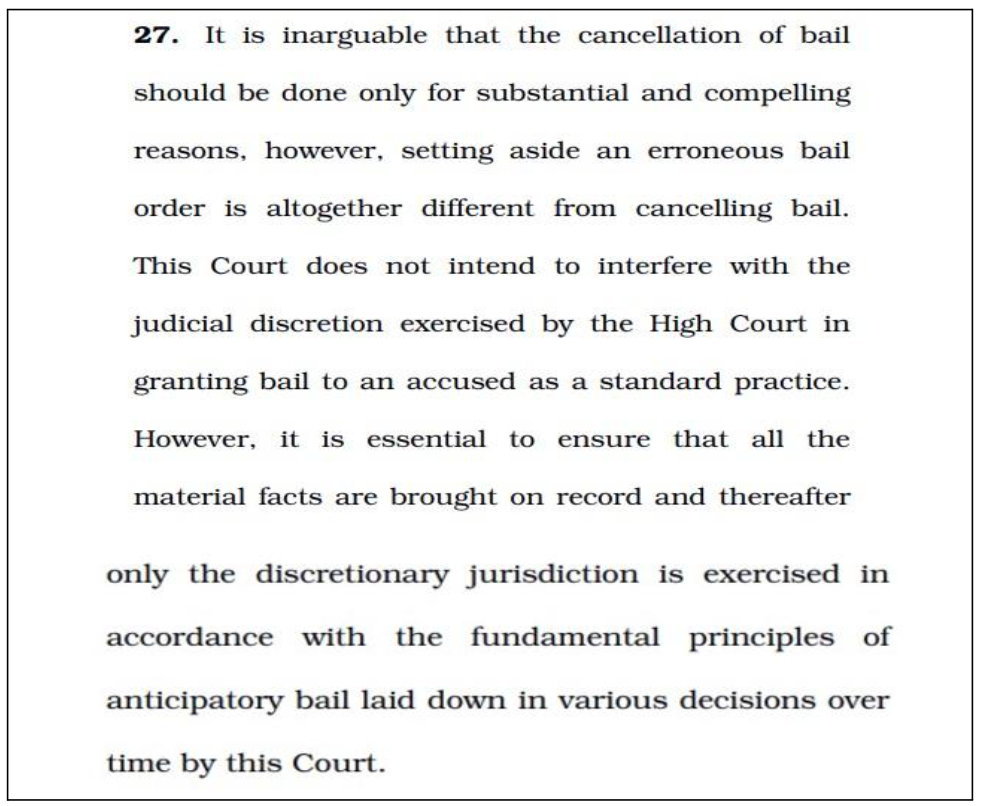
Accordingly, the appeal is allowed, and the decision of the High Court is set aside.
Supreme Court: Penetrative sexual assault on a child below twelve years comes under ‘Aggravated Penetrative Sexual Assault.’
The Supreme Court, in State of U.P. vs. Sonu Kushwaha, held that penetrative sexual assault against a child under twelve years of age comes under Section 5 of the Protection of Children from Sexual Offences Act, 2012 (POCSO Act, 2012) and held that courts cannot impose lesser than the minimum sentences prescribed in the act.
The two-judge bench of the apex court comprising of Justice Abhay S Oka and Justice Sanjay Karol was hearing an appeal by the state against the judgement of Allahabad High Court that reduced the substantive sentence of the accused to seven years from the earlier ten years. The question of the appeal in the apex court is only whether the respondent is guilty of an offence of aggravated penetrative sexual assault punishable under Section 6 of the POCSO Act.
Section 3 of the POSCO Act defines ‘Penetrative Sexual Assault’ and section 4 prescribes punishments for the same.
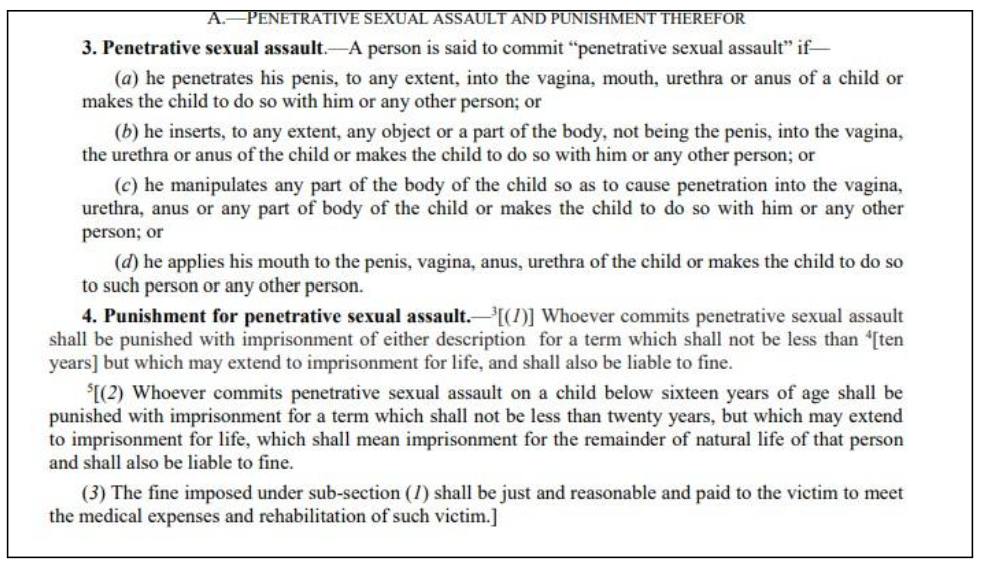
In this case, the High Court recorded the findings that the accused put his penis into the mouth of the victim aged about 10 years and discharged semen therein. This was not challenged by the accused. Accordingly, the High Court concluded that the act was of penetrative sexual assault and prescribed a punishment under section 4 of the act.
From clause (m) of Section 5 of the POCSO Act that defines the situations which can be considered as ‘Aggravated penetrative sexual assault’, it is clear that penetrative sexual assault on a child below twelve years comes under the definition of ‘aggravated penetrative sexual assault’.

Section 6 of the same act prescribes the punishment for the same.

The apex court held that the High court in this case erred by holding that the act committed by the respondent was not an aggravated penetrative sexual assault. The apex court further talked about the intent behind the POCSO Act and held that there is no provision to impose lesser punishments under the said act.
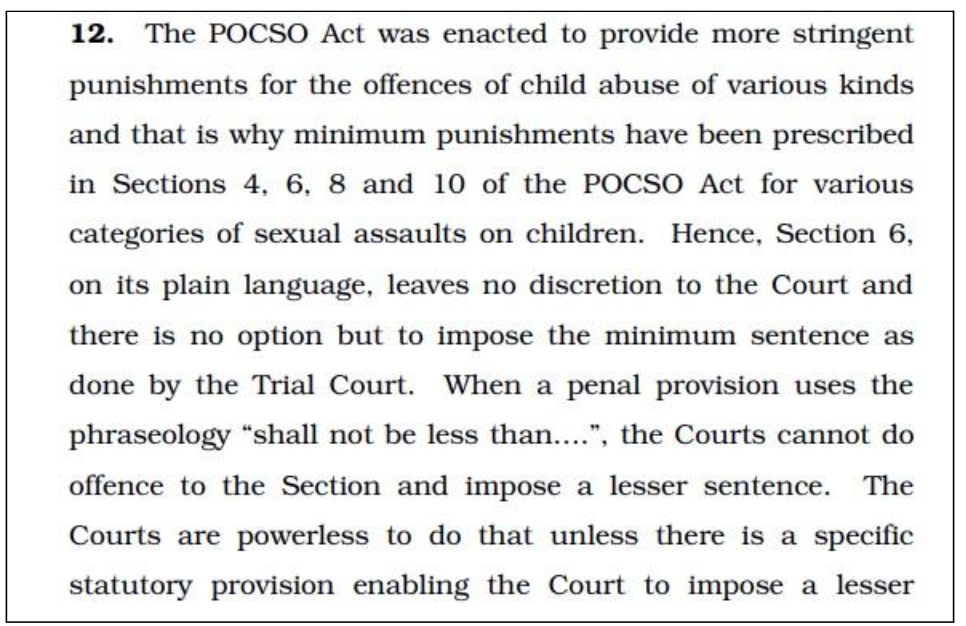
Accordingly, the judgement of Allahabad High Court is set aside, and the appeal is allowed.
Kerala HC: A threat or abuse by a man towards a woman would not attract the offence of stalking, intent “to foster personal interaction despite a clear indication of disinterest” is an essential ingredient.
In Jayaprakash P.P vs. Sheeba Revi, the Kerala High Court held that in order to attract Section 354-D(1)(i) of IPC, the prosecution has to establish that a man followed a woman and contacted or attempted to contact her to foster personal interaction repeatedly despite a clear indication of disinterest by such woman. The section takes in acts revealing sexual interest or lewd acts of man. Acts of mere threats or abuse do not attract the offence of stalking.
The single-judge bench of Justice K Babu was hearing an appeal to quash the final FIR report and other such proceedings filed against the appellant. In this case, the petitioner worked as an Assistant Zilla Sainik welfare officer at Zilla Sainiks. He was accused of repeatedly calling and threatening the Zilla Sainik Welfare Officer. It is further argued that the accused intentionally tried to annoy her by sending her WhatsApp messages. He is charged under IPC Sections 354D (stalking) and 509 (insulting a woman’s modesty).
The counsel for the appellant argued that the ingredients for attracting Section 354D of IPC were absent in the allegations levelled against the accused whereas the counsel for the respondent contended that repeated attempts to contact a woman over the phone or in any other manner attract the offence under Section 354-D of the Indian Penal Code.
Upon hearing both sides, the apex court looked at the history of section 354D of IPC. It was added based on the report of the committee on amendments to the criminal law headed by Justice J.S. Verma. The section 354D reads as below.
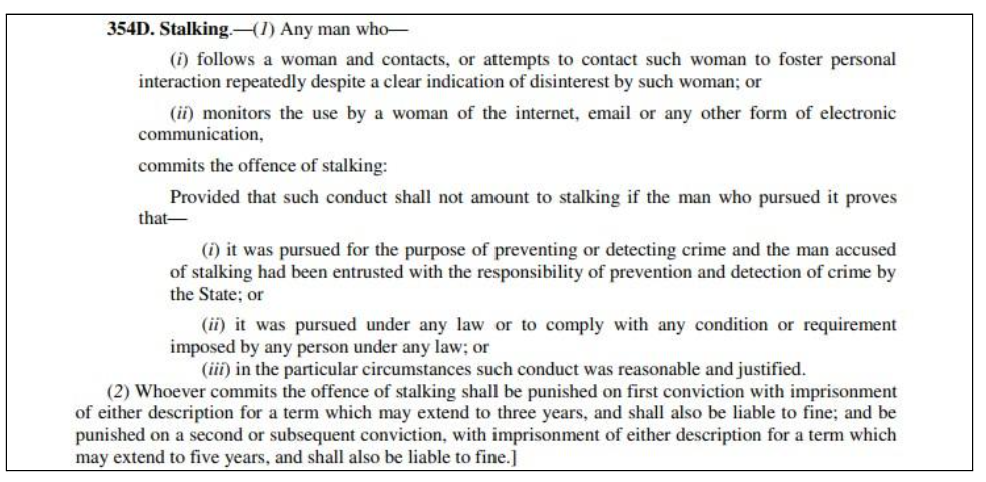
The court held the intention behind the legislation is to implicate those who maintain “behavioural patterns” of sexual offenders and not to be misused. The relevant extract of the parliament debate is as below.

The court observed that the essential ingredient to attract section 354D of IPC is “to foster personal interaction despite a clear indication of disinterest” by the woman. The court further relied on the judgement in Singaraju Somasekhar vs. State of Telangana, whereby it was held that,
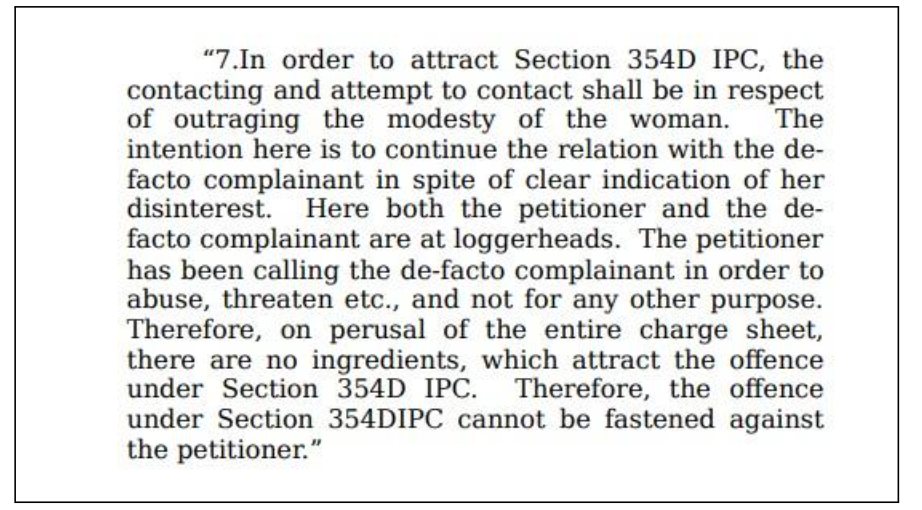
Further, the petitioner also faces a charge under Section 509 of IPC, which deals with “Word, gesture or act intended to insult the modesty of a woman”.

The court relied on Ramesh v. Sub Inspector of Police, whereby it was held that to attract section 509 of IPC, a definite allegation of insult to the modesty of women or intrusion to the modesty of women or intrusion to the privacy of women must be present. The test of the outrage of modesty must, therefore, be whether a reasonable man will think that the act of the offender was intended to or was known to be likely to outrage the modesty of the woman. In this case, no evidence can be made out based on the allegations in FIR.
Relying on the judgement in State of Haryana and Others vs. Bhajan Lal and Others on the exercise of the extraordinary powers under Article 226 of the Indian Constitution, the High Court quashed the proceedings in this case.
Delhi HC: The Sexual Harassment of Women at Workplace (Prevention, Prohibition and Redressal) Act, 2013 (SHW Act), is also applicable when the victim and delinquent employee are employed in different departments/office.
In Dr Sohail Malik vs. Union of India & Anr, the Delhi High Court held that there is nothing specific in the SHW Act that limits its scope to cases where the victim and delinquent employee work together. It is applicable to cases where the workplaces of victim and delinquent employees are different.
A two-judge bench comprising of Justice C. Hari Shankar and Justice Manoj Jain was hearing a plea filed by an Indian Revenue Service (IRS) officer who was accused of sexually harassing an officer from another department. The IRS officer sexually harassed the women employee and when the employee filed an official complaint with the Internal Complaints Committee (ICC) of her department, the ICC summoned the IRS officer asking him to appear. These summons were challenged before the Central Administrative Tribunal (CAT) questioning the jurisdiction of the ICC. The CAT dismissed the officer’s plea, and hence this writ petition.
The petitioner’s counsel argued that both employees are governed by different service rules and the report of ICC is to be submitted to the employer, in this case, the head of the department of the victim, who has no disciplinary control over the petitioner. On being questioned by the court if the inquiry can be conducted by any other ICC, the counsel for the petitioner pointed out that the provisions of the SHW act are silent in this regard.
Upon careful consideration of the submissions by the petitioner, the court, relying on the principles laid in Shailesh Dhairyawan vs. Mohan Balkrishna Lulla, held that the rule of ‘purposive construction’ has replaced the rule of the plain meaning of the statute as the ―’golden rule’ of interpretation of statutes.
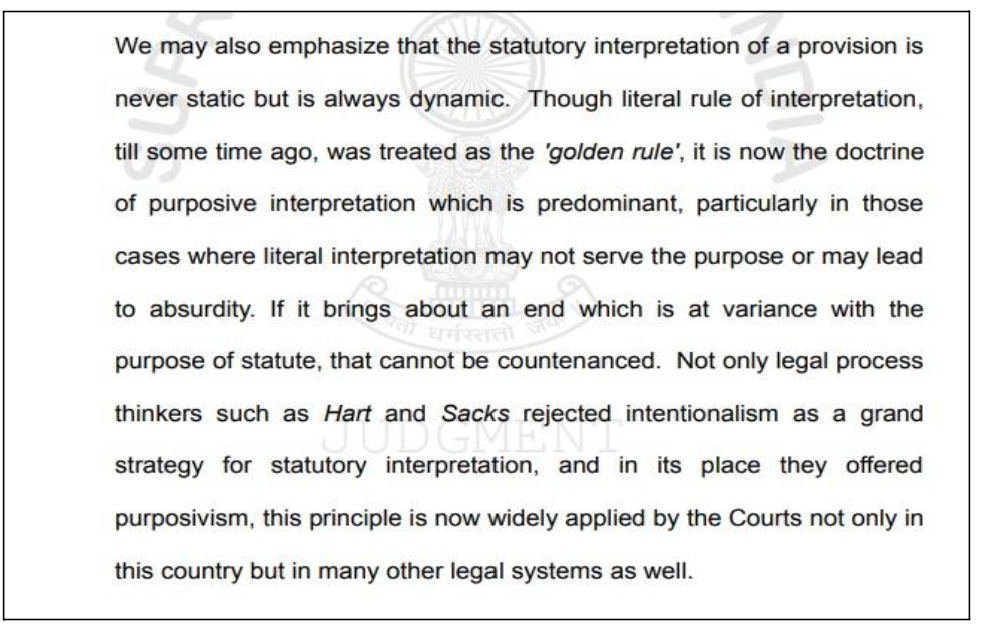
Placing reliance on this, the court further held that any interpretation which would dilute, or defeat, the purpose of the legislation, which is to ensure a safe working environment for women has, therefore, to be sedulously eschewed.
The court further relied on the preamble of the SHW Act.
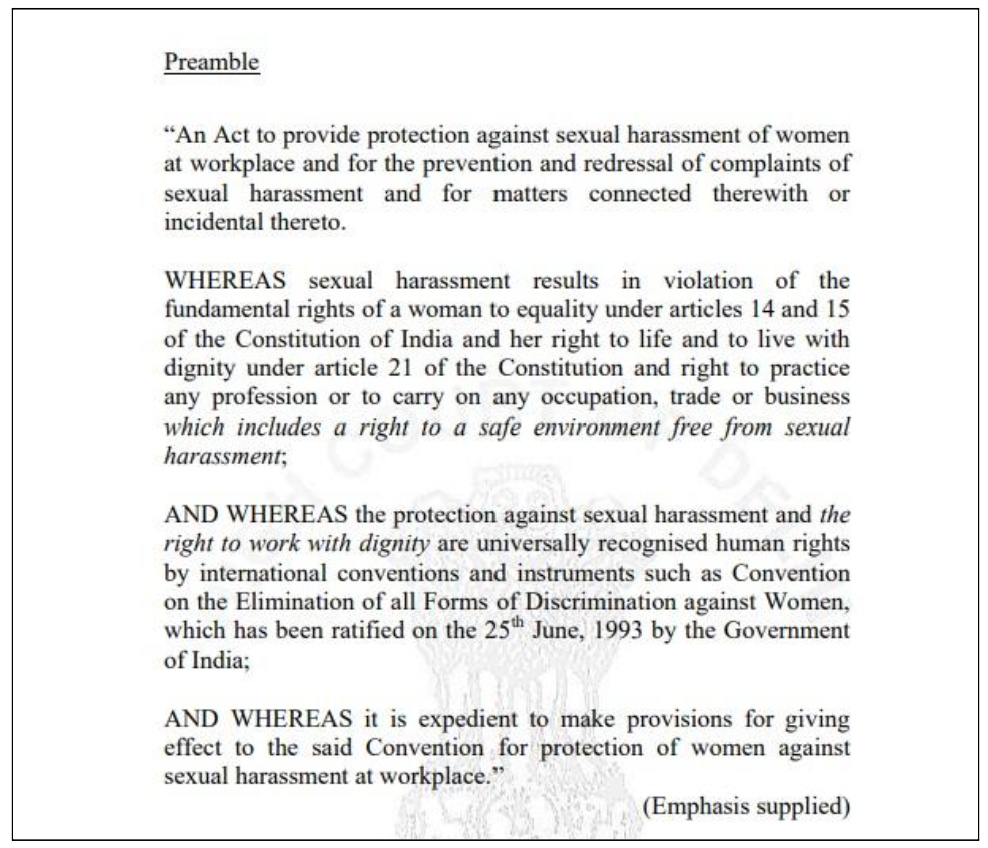
Applying the judgement in the Shailesh Dhairyawan case, any interpretation of the provisions of the SHW Act, which downplays, or impedes the complete achievement and implementation of, one or more of these objectives, has to be firmly eschewed. Such an interpretation would, in our considered opinion, would strike at the very root of the SHW Act, and its ethos and philosophy.
Further, the petitioner’s narrow interpretation of the definition of ‘employer’, ‘workplace’ under section 2 of the act as a challenge to question the jurisdiction is struck down.
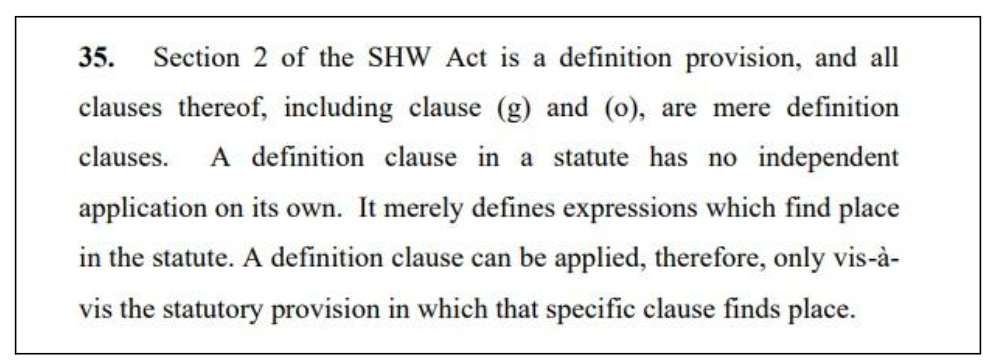
Accordingly, the court held that there is absolutely nothing, in the SHW Act, which limits its scope only to cases where a woman employee is sexually harassed by another employee working in her own office and accepts its application where the delinquent employee is employed elsewhere. The court agreed with the findings of the learned tribunal, and the writ petition stands dismissed.
Jammu and Kashmir and Ladakh HC: Mere harassment of a wife by her husband or in-laws due to matrimonial discord or sarcastic remarks per se does not attract Section 306 IPC
The Jammu and Kashmir and Ladakh High Court, in the State of J&K vs. Tariq Hussain, held that in order to attract provisions of Section 306 of the IPC, intentional aid and active participation of the abettor must be established. Mere matrimonial discords or sarcastic remarks themselves do not attract the provisions of section 306 of the IPC.
A single-judged bench comprising of Justice Rajesh Sekhri was hearing an appeal against the judgement of the Additional Sessions Judge whereby the accused has been acquitted of charges under sections 306 and 498A of the IPC. The brief facts of the case are as follows. The victim and her husband were married for more than two years but had not been able to conceive. They were living separately. Her husband had gone out for labour, who gave her a phone call at 12 o’clock in the night, she requested him to come back but he refused and asked her to go from where she had come. This annoyed the complainant. She doused kerosene oil and set herself ablaze. The victim in her statement mentioned that her husband is responsible for her to take such an extreme step. The trial court has observed that it is a case of suicide and therefore, the husband was acquitted of the charges. This is an appeal against this decision.
Section 306 of IPC is as below.

Upon a bare perusal of sections 107 and 108 of the Ranbir Penal Code (RPC) relating to abetment and abettor, it is clear that to constitute the abetment of an offence, intentional aid and active participation of the abettor must be established. In other words, the prosecution is obliged to prove the intentional aid and active participation of the abettor. Any consequence of cruelty, which are likely to drive a woman to commit suicide or to cause grave injury or danger to life, limb, or health, whether mental or physical of the woman, is required to be established in order to attract the provision of abetment to suicide. Considering the material facts in this case, the ultimate decision taken by the victim in the present case cannot be said to have a direct nexus with the alleged acts committed by the accused.
On the charges of dowry, the court held that mere harassment or mere demand of dowry by itself is not cruelty. A reasonable nexus has to be established between the cruelty within the meaning of explanation (a) of Section 498-A and the suicide within the meaning of Section 306 IPC. Further, the court held that,
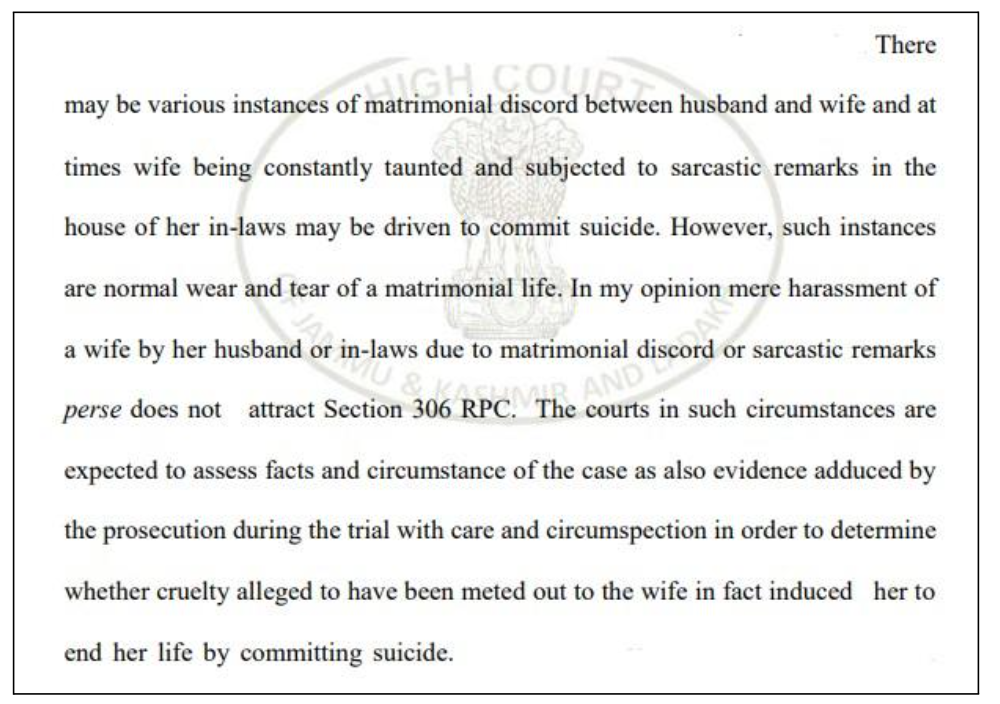
Accordingly, the appeal is dismissed and the impugned judgment is upheld.
Madras HC: Police personnel comes within the ambit of “authorised officer empowered” u/s 21 (4), 22 and 23-A of the Mines and Minerals (Development and Regulation) Act, 1957.
In S Kumar vs. The District Collector and others, the Madras High Court held that police personnel comes within the definition of ‘authorized officer’ under Mines and Minerals (Development and Regulation) Act, 1957 and has the power to seize vehicles and compound offences. The Government Orders regarding the same are well within the powers and jurisdiction of the state government.
The full judge bench of the High Court was hearing the questions of law referred to it by the division bench of the High Court. Initially, a writ petition was filed by S Kumar to direct authorities to permit him to continue his crusher operation and to take back his vehicles. When the division bench heard the matter, it was unclear as to which authority has power to seize vehicles under the Act. Section 21(4) of the Act empowers an officer or a specially empowered authority to seize any mineral tool, equipment, vehicle, or any other thing which is used for transporting any mineral unlawfully.
The court held that the statute and subsequent rules must be interpreted harmoniously for the realization of the objectives of the said statute. Accordingly, the extension of power to police personnel by the state government is valid.

When the State Government, conscious and in the exercise of its powers u/s 15 has authorised the police personnel, not below the rank of Inspectors of Police, to be officers to effect seizure u/s 21 (4) of the MMDR Act, the said action can neither be called to be beyond the powers of the State Government nor could it be said to be arbitrary and illegal.
Regarding the empowerment of the police personnel as “authorised officer” u/s 22 of the MMDR Act for the purpose of filing a private complaint before the Court of competent jurisdiction is concerned, the court relied on the Sanjay and Kanwar Pal Singh cases, whereby it was implied that the power of the police authority to file a private complaint is not only recognized, but also approved.
On the question of Joint trial of offences under the Act and IPC, the court held that the Special Courts constituted under the MMDR Act shall jointly try the offences under the MMDR Act as well as the offence u/s 379 IPC so as to avoid any possible conflict in the decision.
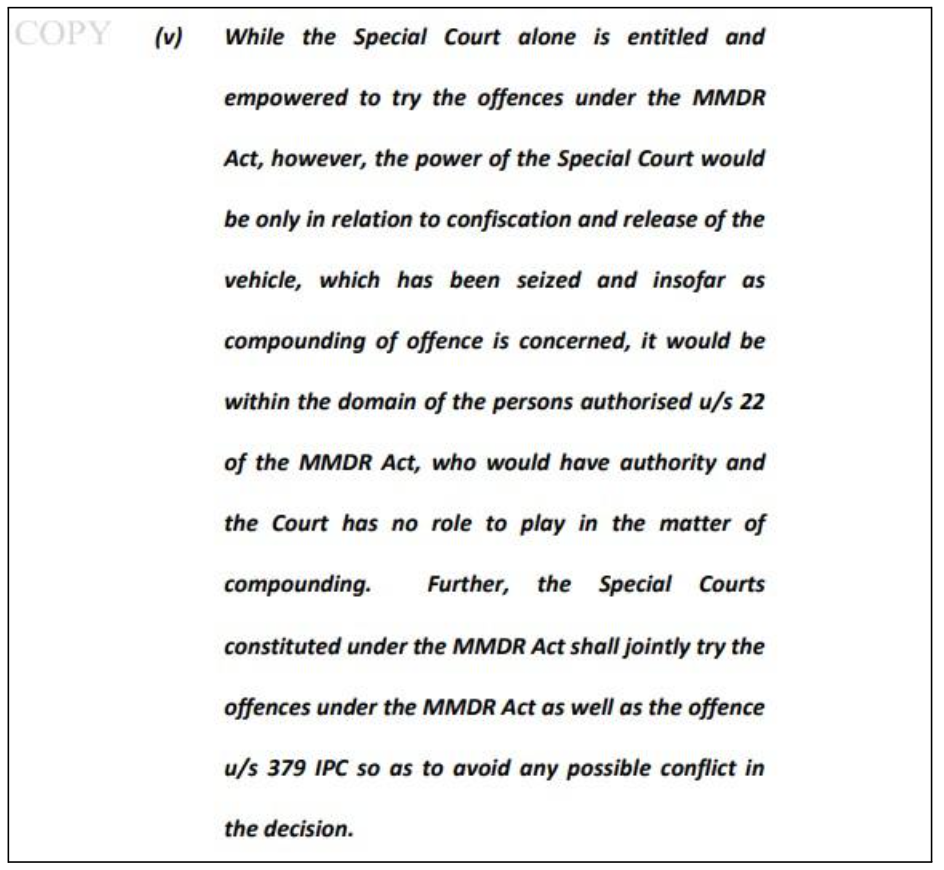
Accordingly, the case is disposed.


